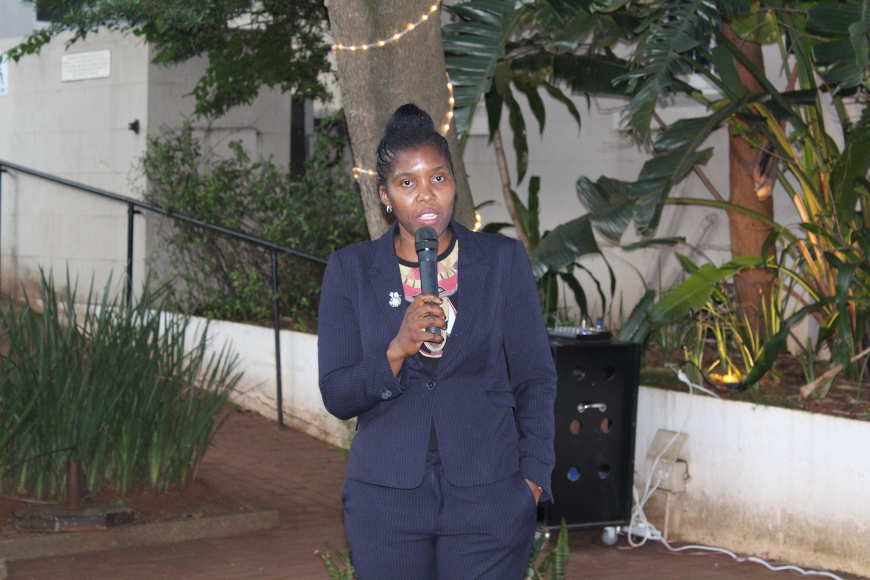The KZNSA and the Durban University of Technology’s (DUT’s) Urban Futures Centre held a talk by guest speaker, Beryl Mphakathi, eThekwini Deputy City Manager, around urban space and a book launch, looking at Kenneth Gardens as Durban’s largest low income housing estate, at the KZNSA Gallery, Bulwer Road, on 9 November 2018.
Speaking at the event, Professor Monique Marks, Head of the Urban Futures Centre at DUT, who is also one of the authors, spoke about the book called VOICES OF RESILIENCE – A Living History of the Kenneth Gardens Municipal Housing Estate in Durban.
DUT academics, Prof Marks, Dr Kira Erwin and Tamlynn Fleetwood have penned this riveting read which highlights Kenneth Gardens, reflecting a unique look into contemporary low-income living in the surrounds of what was under apartheid known as the white middle-class suburbs.
Prof Marks has published widely in the areas of youth social movements, ethnographic research methods, police labour relations, police organisational change and street-level drug use.
Kira Erwin is a sociologist and senior researcher at UFC, and is currently leading a number of research projects that address issues of migration and inclusion.
Tamlynn Fleetwood is an independent researcher and evaluation specialist across a wide range of areas in the social sciences, namely education, urban and environmental issues, housing, and the informal economy.
Speaking about the background to the book, Prof Marks said she used to drive past Kenneth Gardens every day and always wondered what went on in the estate.
“I was very interested about the place and the people who lived there and wanted to know more. As I was working with Dr Erwin at the University at the time, we spoke about it, as she had a personal interest in Kenneth Gardens as she grew up there,” she said.
She added that Kenneth Gardens is Durban’s largest low-income municipal housing estate. Initially, it was built for ‘poor whites’, Kenneth Gardens, today it is arguably one of the most socially diverse living spaces in the city.
“While the estate is significant in terms of its size and social make-up, very little has been written about it. The book gives an account of Kenneth Gardens through the oral history stories of its residents. The book delves into the history of social housing, identity formation and change, urban planning, and state regulation. Many of the story tellers reveal intimate moments of struggle in their lives. But what emerges more strongly than vulnerability and hardship is embedded resilience and adaptability,” she stressed.
Prof Marks added that what makes Kenneth Gardens unique is the fact that it’s a mid-density housing development and the most diverse space in terms of age, religion and race.
Lastly, she stressed that the lessons that can be taken by the city in terms of social housing is to remember that when developing to bear in mind that people need access to amenities such as hospitals, shops and place of employment.
EThekwini Municipality’s Deputy City Manager of the Human Settlements, Beryl Mphakathi spoke more on the eThekwini Municipality’s plan to be the most caring and liveable city by 2030.
However, she added that segregation in Durban has not changed significantly since the Apartheid era and that Black areas remained relatively further away from major transport networks and hubs of employment. She said that the municipality acknowledges the space phenomena and is open to collaborations in terms of planning ahead for social housing in a bid to rejuvenate the inner city and draw investment back to the region.
The city plans to build housing units in uMgeni Road, Albert Park, the old Durban Drive-In site, to name but a few.
“This will be a mixed-use, mixed-income development with economic activity taking place within the social housing. The Social Housing Act states that social housing has to exist with the inner city. Realistically, people reside in the inner city and it is up to the City to make it formal. Living in the vicinity where these professionals work will be an advantage to them,” she said.
Mphakathi said the next step was to ensure the city was like other thriving cities in the world which had inclusive, mixed-use and integrated communities.
Pictured: Deputy City Manager of the Human Settlements, Beryl Mphakathi, speaking around urban space.
Waheeda Peters


